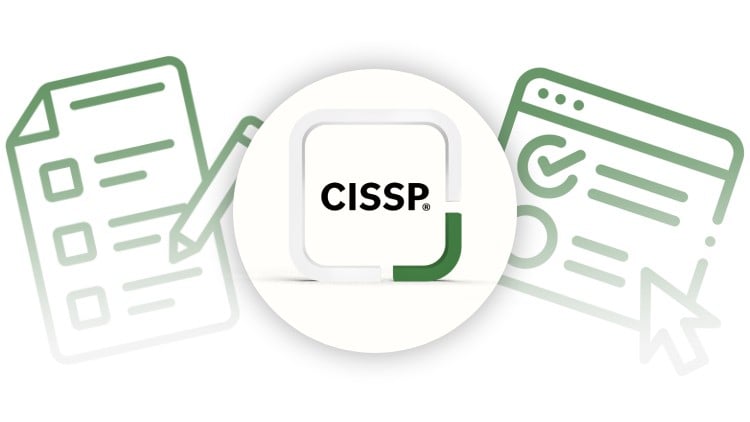
Prepare the Certified Information Systems Security Professional (CISSP) 125 high-quality test questions with explanation
⭐ 3.70/5 rating
👥 1,447 students
🔄 June 2025 update
Add-On Information:
Note➛ Make sure your 𝐔𝐝𝐞𝐦𝐲 cart has only this course you're going to enroll it now, Remove all other courses from the 𝐔𝐝𝐞𝐦𝐲 cart before Enrolling!
- Course Caption: Prepare the Certified Information Systems Security Professional (CISSP) 125 high-quality test questions with explanation 3.70/5 rating 1,447 students June 2025 update
- Course Overview:
- This Certified Information Systems Security Professional (CISSP) course offers an in-depth, strategic dive into enterprise-level information security. It’s designed for professionals aiming to master the architectural design, management, and governance frameworks critical for protecting organizational assets. The CISSP credential is a globally recognized benchmark for cybersecurity leadership, validating comprehensive expertise across multiple security domains. This program goes beyond exam preparation, fostering a deep understanding of proactive risk management, robust incident preparedness, and continuous security posture improvement. It cultivates a vendor-neutral mindset, focusing on universal security principles applicable across diverse technologies. This course is an investment in developing the strategic foresight needed to guide an organization’s security future and address emerging threats effectively, positioning you as a key influencer in cybersecurity strategy.
- Requirements / Prerequisites:
- Candidates typically require a minimum of five years of cumulative paid full-time work experience in at least two of the eight CISSP Common Body of Knowledge (CBK) domains. This practical experience is essential for applying theoretical knowledge to real-world security challenges.
- A four-year college degree or an approved ISC² credential can substitute one year of experience, reducing the prerequisite to four years.
- Adherence to the ISC² Code of Ethics is mandatory for all CISSP holders.
- While not formally required, a foundational understanding of networking, operating systems, and basic security principles is highly recommended. Prior exposure to IT governance, risk management frameworks, and compliance (e.g., GDPR, HIPAA) is also beneficial.
- Success demands significant self-discipline, rigorous study, and critical analysis skills, as the certification focuses on complex, high-level security scenarios.
- Skills Covered / Tools Used:
- Strategic Risk Management: Develop expertise in identifying, assessing, and mitigating information security risks at an organizational level, utilizing quantitative and qualitative analysis methods and implementing effective treatment strategies.
- Security Architecture & Engineering: Master the principles for designing, implementing, and securing information systems, applications, and infrastructure, encompassing secure development lifecycles, cryptography, and physical security.
- Security Operations & Incident Management: Gain proficiency in managing daily security operations, including robust incident response planning, disaster recovery, business continuity, and security awareness programs.
- Identity & Access Management (IAM): Understand core IAM concepts like authentication, authorization, accountability, single sign-on, and directory services to control access effectively.
- Security Governance & Compliance: Learn to establish comprehensive security governance frameworks, ensuring adherence to legal, regulatory, and organizational requirements, and developing robust security policies.
- Network Security: Acquire deep knowledge of secure network architectures, communication protocols, intrusion detection/prevention systems, and firewall management.
- Software Development Security: Integrate security practices throughout the entire software development lifecycle (SDLC), addressing vulnerabilities and promoting secure coding.
- Tools & Methodologies (Conceptual): The course covers the application of conceptual tools and frameworks, including threat modeling, principles of security auditing, risk assessment matrices, security policy templates, and various assessment methodologies like penetration testing and vulnerability scanning concepts.
- Benefits / Outcomes:
- Elevated Career Trajectory: Achieve a globally recognized credential that significantly enhances your professional credibility and marketability, opening doors to senior leadership roles such as CISO, Security Manager, and Security Architect.
- Comprehensive Security Acumen: Gain a holistic, vendor-neutral understanding of information security across all domains, enabling you to design, implement, and manage enterprise-wide security programs effectively.
- Enhanced Earning Potential: CISSP holders consistently command higher salaries, reflecting the high demand for their advanced expertise in the cybersecurity field.
- Strategic Influence: Develop the leadership skills necessary to drive security initiatives, influence organizational decision-making, and contribute meaningfully to overall business strategy.
- Global Peer Network: Join an exclusive community of over 160,000 certified professionals worldwide, fostering opportunities for networking, collaboration, and continuous professional development.
- Mastery of Best Practices: Internalize industry-leading best practices and frameworks for information security, equipping you to protect an organization’s most valuable assets against evolving cyber threats.
- PROS:
- Global Recognition and Prestige: The most respected cybersecurity certification worldwide, immediately signaling a high level of expertise.
- Comprehensive Skillset: Covers a very broad range of security domains, providing a holistic understanding essential for senior roles.
- Significant Career Advancement: Highly sought after by employers for leadership and management positions in cybersecurity.
- Increased Earning Potential: Often associated with a substantial increase in salary and compensation packages.
- Vendor-Neutral: Focuses on foundational principles and best practices applicable across diverse technologies.
- CONS:
- High Experience Barrier: The requirement for significant relevant work experience can deter those earlier in their cybersecurity careers.
Learning Tracks: English,IT & Software,IT Certifications
Found It Free? Share It Fast!